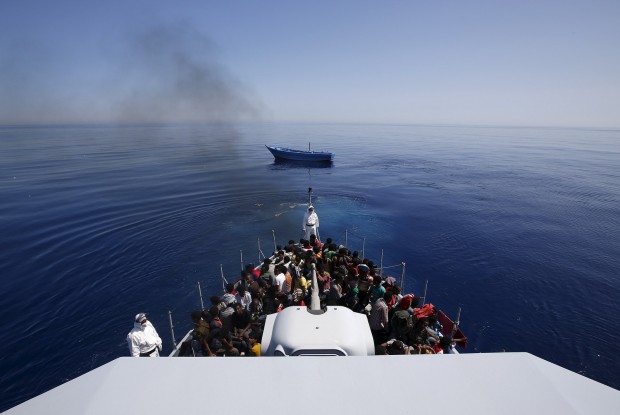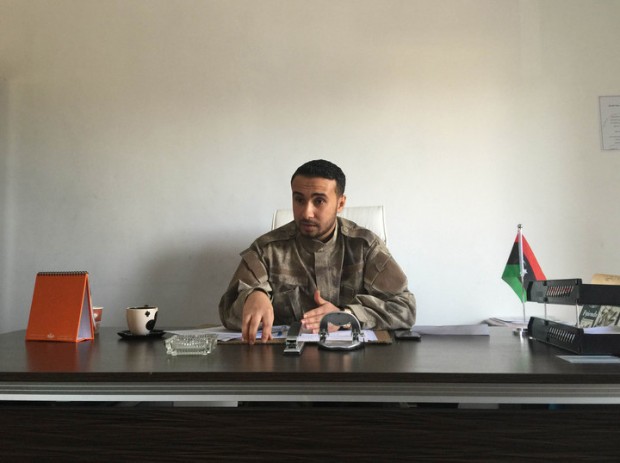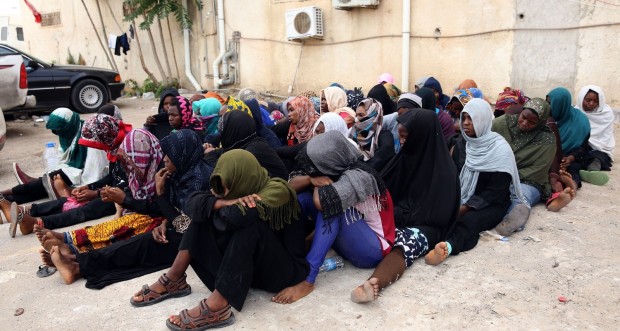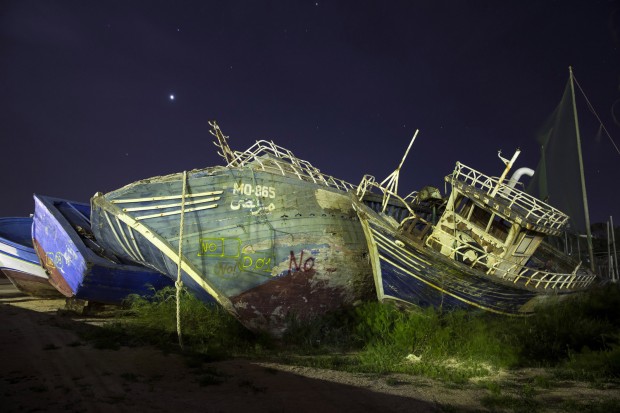Libya takes a step ahead to counter human trafficking networks, at last

His name was Koffi, one of the hundreds of thousands of African migrants who make their way into Libya, either to work as day laborers or to use it as a staging post on their way to Europe. But unlike many other undocumented migrants, who are often fearful and subservient, Koffi had a confident, almost regal, bearing. He wore clean, pressed clothes, Libyan security officials said. The militiamen who stopped him at the checkpoint, searched his belongings, and took him back to the detention, had only one question.
What was a guy like him doing with $40,000 in cash?
“He said, ‘The money is mine. I work. I transport people from Libya to Europe,’” recalled First Lt. Mohamed Ahmed al-Baqer, head of the office of deportation at Libya’s Interior Ministry, during a recent interview at the headquarters of the counter-migration force in the Libyan capital, Tripoli.
Baqer recalled Koffi describing a years-long relationship with a human smuggling kingpin named Abdel-Basset.
So Libyan counter-migration officials made a deal with Koffi: Give us your boss and we’ll give you your freedom. He agreed, giving them one of their biggest breaks in recent months as they seek to tackle the multibillion-dollar underground business of smuggling people from Africa to Europe.

Baqer is a slim, compact 24-year-old native of the Libyan city of Misrata. He apologized profusely as he arrived an hour late for a morning meeting, and took up a seat behind his desk. Immediately set upon by officials demanding that he sign or stamp documents, he went about his business with a sigh before slamming the door shut to prevent further interruption.
Despite his youth, Baqer has risen quickly up the ranks of Libya’s security forces, which collapsed following the 2011 overthrow of the former dictator, Muammar al-Qaddafi. Just a month earlier, he said proudly, he had been promoted to director of his department.
Baqer declined to reveal Abdel-Basset’s last name for legal reasons. But he did confide that Abdel-Basset hailed from one of the main Libyan tribes, and that fully identifying him could create a backlash against his agency. “There are some people who come from very well-known families involved in the smuggling business,” he said
Koffi, whose last name is not being revealed for fear of endangering him and his family, was born in Mali, and moved to Libya in 1996, where he found work as a day laborer in the construction sector for 12 years. He met Abdel-Basset on a job at a large farm near the city of Zliten, in the rural stretch of land between Tripoli and Misrata, where he noticed hundreds hundreds of Africans were housed in a large hangar, he told Baqer.
Koffi asked about them. “Abdel-Basset said he helps them go to Europe,” Baqer recounted. “Koffi said he had some friends who wanted to go to Europe too.”
“In addition to migrants, he smuggled drugs, alcohol, and even exotic animals.”
Thus a partnership was forged. Koffi recruited paying clients, oversaw the transport and coordinated the arrival African migrants willing to pay to attempt sea crossings. For this, he got a cut of the profit, becoming a sort of supply-chain manager in the human-smuggling operation. Over the years, Koffi got to know more about Abdel-Basset’s extensive operations. They included several farms ranging up to 12 acres in size, equipped with storage hangars to shelter large numbers of migrants, several tractor-trailer trucks, and an extensive collection of boats, according to Libyan officials. Battered by cheap imports and five years of war and instability, many Libyan farmers have turned their agricultural plots into way stations along the migrant smuggling highway. Abdel-Basset made money any way he could, mostly illegally. “In addition to migrants, he smuggled drugs, alcohol, and even exotic animals,” said Baqer.
Counter-migration officials convinced Koffi to lure Abdel-Basset into a trap. A week after his detention, in June 2015, Koffi called Abdel-Basset and told him he had gathered a group of migrants who wanted to pay for seats aboard one of his boats. At a rural crossroads between Tripoli and the town of Zliten, security officials nervously lay in wait, hoping Abdel-Basset would take the bait.
He showed up on time, and Libyan officials swooped in and arrested him. Now, he is sitting in jail in Tripoli, as his prosecution on multiple smuggling charges winds its way through Libya’s dysfunctional court system. Koffi was also locked up for two months, just so Abdel-Basset and his crew wouldn’t suspect his treachery.
Months later, one of Baqer’s men received a phone call. It was from Koffi. He had used his small fortune to make the same journey to Europe he had facilitated for others for years, albeit by plane and with a visa. “He had taken his whole family there,” he said. The Mali embassy had even agreed to allow Koffi to take his $40,000 with him to set up a new life.

The metal doors of the cell screeched as the guard opened the gate. Inside, more than a hundred African migrants sat in the stifling heat. There were just three toilets, and a few windows high up near the ceiling. Flies swarmed about in the building, one of several in a gated compounded in southeast Tripoli.
It was prayer time, and around half the men were gathered at one side of the cell, kneeling and bowing in unison. The others watched Superman Returns on a big-screen television mounted on the wall. The smell of vomit hung in the air. Wars and political repression in Africa, and the breakdown of order in Libya, have increased the number of migrants coming to the country. Libyan officials admit they are overwhelmed by the flood of migrants into detention centers and onto the streets, which require some 30,000 officials, guards, doctors, and nurses to manage.
“The problem we face is that we didn’t receive proper training on how to deal with these migrants,” said Baqer. “Our training was how to deal with criminals.”
An estimated 1 million illegal migrants arrived last year in Europe, perhaps a third via Libya, compounding a vast influx of people from war-torn and impoverished parts of Africa and Asia. Over the last few weeks, departures from the shores of Libya and neighboring Tunisia have subsided, with winter seas considered too dangerous. Now Libyans are bracing for springtime, when migrant activity picks up as warm, still Mediterranean waters entice a surge of illegal boat departures.
Until recently, Libyan officials, mired in their own internal civil and political conflict, downplayed illegal migration, viewing it as a European problem. But they are discovering increasingly that illegal migration is not only about people from Africa and Asia heading to Europe, but can hurt Libyans as well. The country now has become a destination for foreign jihadis as well as a transit point for weapons and drugs that find their way into local black markets.
Hashish comes from Morocco, while guns flow out of Libya, looted from Qaddafi’s bunkers.
Primarily, Libyan officials have grown more serious about stopping illegal border crossings and dismantling smuggling networks because they are now seen as part and parcel of the growth of ISIS in Libya. The group has recruited foreign fighters to its strongholds and used Tunisians to carry out suicide operations, including a January attack that was the country’s worst ever.
“With respect to the other problems Libya is having — such as terrorism — the perpetrators are entering via illegal immigration, including those jihadis from Tunisia,” said Sgt. Ayoub Massoud, a security official at the Interior Ministry’s counter-migration department in Tripoli.
Officials have also discovered strong ties between the networks smuggling migrants and those moving weapons and drugs. Hashish comes from Morocco, while guns flow out of Libya, looted from Qaddafi’s bunkers in the wake of the regime’s 2011 collapse. Gangs from Africa network with counterparts in Europe forming broad transnational crime syndicates.
“The bigger problem is in the deserts where the criminal gangs have the freedom to pursue their activities,” said Mohamed el-Emtani, spokesman for the joint operations room in Misrata, which collates and coordinates intelligence from various armed forces in central Libya.
In recent months, as the crackdown on the illegal migration industry has begun to intensify, Libyans say they’ve gleaned precious intelligence about the vast, profitable infrastructure of human smuggling networks that take people on the dangerous and often-deadly trail from Sub-Saharan Africa through lawless Libya and onto flimsy boats bound for European waters.

Mohamed Gliwan had a plan.
The wiry former television broadcaster is a leader of the Third Force, a Misrata militia deployed to oil rich southern Libya in 2014 primarily to stop fighting between rival ethnic clans. During his frequent travels along the dangerous roads between the coast and southern cities like Sabha and Owbari, he checks in on other fighters stationed at various checkpoints along the route. At one stop last year, he encountered two teenaged women from Niger detained at a Third Force checkpoint, awaiting transfer to a migrant detention center. He had time so he offered to take the women to safety so they didn’t have to spend the night at a checkpoint.
The chain-smoking Gliwan has a flair for the dramatic, seeing himself as a kind of adventurer and filmmaker, and he spent an hour showing off video clips he’d made of his men driving through the country’s stunning southern desert landscapes, set to patriotic music.
Gliwan’s latest idea came to him as he drove along with the teenage women. He decided he would call the women’s contact, pretend to be their taxi driver and get directions. He would then call a band of Third Force fighters to join him. He would drive the girls to the safehouse, using them as bait, and then nab the smuggler.
They encountered the smuggler, who also came from Niger, at a safehouse in the city of Jufra. Gliwan and his comrades demanded he tell them what he planned to do with the two girls. In exchange for being truthful, they would release him, he said.
The answer stunned them.
“He was supposed to house them, and then two other guys were supposed to impregnate them, and then when they reach the seventh or eighth month, they’re put into a vessel on the coast,” said Gliwan.
The notion was that European Coast Guard officials would treat migrants grouped with a few pregnant women a lot more kindly and favorably. Indeed, press accounts frequentlydescribe pregnant women aboard the migrant ships.
“That’s why so many of the migrants are pregnant,” he said.
As they work their way up the human smuggling network, Libyan investigators are discovering the elaborate lengths to which unscrupulous racketeers will go. Libyans have repeatedly found freight trucks equipped with secret compartments into which migrants are squeezed. In one incident last summer, a truck carrying concrete bricks flipped over, revealing a hidden container; some of the migrants were crushed to death in the accident.
Police have stepped up arrests of illegal migrants. Stuck in the southeast Tripoli detention center, Mohamed Lamin Danpha from Gambia said he was arrested in January after living illegally in Libya for nearly five years, working as a photographer at a studio in Tripoli for $200 per month.
“I don’t know what will happen to me,” he said, speaking passable English, as he sat in the cell with the 100 or so others. “My employer wants me to stay.”
Back in his office, Baqer’s adjutants continued to press him for his signature on a seemingly endless series of documents. Instead of just locking up the human traffickers, Libyan security officials now try to grill them for intelligence, creating yet more reams of paperwork. They recently caught a Ghanaian man on an inflatable raft with 80 people. He told his Libyan captors he was handed a compass and a satellite phone, given a 20-minute class on boat navigation and sent on his way.
“Their teacher was a Libyan guy,” Baqer said. “The smuggler tells them to point the boat toward Lampedusa or one of the Italian naval patrols and call on the Thuraya [satellite phone] once they enter international waters.”
Last summer they caught a boat vendor, a 27-year-old named Khaled Zuwari who had sold his boat to a smuggler for 30,000 dinars, or about $15,000. The smuggler had then offered 100 places on the boat for between $900 and $1,500 each — earning $130,000 for the entire trip.
“Khaled was convinced by the smuggler he was doing the right thing,” said Baqer. “That he was fulfilling his Islamic duty. That he was providing good pious service.”
Hundreds of people involved in the migrant-smuggling business are locked up in jail in Libya. Perhaps 20,000 migrants languish in detention centers facing deportation. But the industry kingpins remain elusive, protecting by wide open spaces and vast fortunes. “We’re talking tens of millions of dollars,” Baqer said. “There are huge amounts involved.”
How to submit an Op-Ed: Libyan Express accepts opinion articles on a wide range of topics. Submissions may be sent to oped@libyanexpress.com. Please include ‘Op-Ed’ in the subject line.
- Libya, Mozambique Advance Major Rice Project - January 16, 2025
- Libyan PM Holds Official Talks with Turkish President - January 16, 2025
- Analysis: Examining the Terms of Gaza’s New Ceasefire Agreement - January 16, 2025


